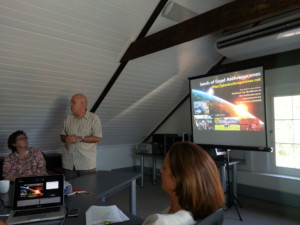 What kinds of values, communities and lifestyles will make it possible for human beings and planetary ecosystems alike to thrive in a new geological era of our own making? How will humans face the overlapping complex challenges of climate change, food and water security, biodiversity loss, poverty and inequality, and socio-political and economic instability?
What kinds of values, communities and lifestyles will make it possible for human beings and planetary ecosystems alike to thrive in a new geological era of our own making? How will humans face the overlapping complex challenges of climate change, food and water security, biodiversity loss, poverty and inequality, and socio-political and economic instability?
These are core questions to be explored in a new dialogue series launched by the CST. A new geological epoch, the Anthropocene, has been proposed to acknowledge the profound and accelerating impacts of human activity on the biosphere — particularly as signs emerge that human-induced climate change may be unraveling the climatic stability of the past 11,000 years that has enabled complex human societies to develop and flourish.
“Meeting the Anthropocene Challenge will require a fundamental shift in world views and in the values that shape individual choices and society. It’s almost impossible to imagine such a radically different future,” Prof. Oonsie Biggs, SARChI Chair in Social-Ecological Systems & Resilience at the CST and also affiliated with the Stockholm Resilience Centre in Sweden, told dialogue participants.
The ‘Anthropocene Dialogues’ series kicked off 22 Feb, with a lively discussion of work presented by Prof. Biggs and her CST colleagues Dr. Rika Preiser and Dr. Laura Pereira.
Prof. Biggs introduced the Seeds of the Good Anthropocenes, an international project seeking out socio-ecological ‘bright spots’ around the world that have the potential to help shape a positive future. A diverse collection of more than 400 Seeds has been gathered since the project was initiated in 2014. These range from small social-ecological businesses to urban farming projects.
The Seeds project serves as a counterpoint to dire scenarios so often cast for the future, and instead draws on the complexity thinking perspective that radical, transformative change can emerge from small pockets of innovation. The future may be unrecognisable to the present, but the seeds of the future are germinating in the liminal spaces of the present.
Dr. Preiser and Dr. Pereira then outlined key points from a paper they have been developing in response to a series of blog posts exploring and debating the ways in which the Anthropocene is framed and engaged with as a concept, and the implications this has for sustainability and a position of care for, as opposed to control over, both people and planet.
The speakers identified four ways in which scholars from different fields, predominately from the Global North, are currently engaging with concepts of the Anthropocene — and outlined new thinking to develop a fifth position from the Global South.
Current framings of the Anthropocene include an eco-modernist, techno-centric perspective; a position of ‘planetary stewardship’ based on social-ecological systems thinking; a ‘pathways to sustainability’ approach that looks for new pathways of development to reduce global inequalities; and a post-humanist perspective that rejects ontological distinctions between humans and nature, recognising humans as a force of nature that is at the same time inextricably interconnected with nature, she said.
A fifth position puts forward the dimensions of ethics, responsibility and justice as necessary for engaging in the current social-ecological crisis — particularly as we confront the limitations of empirical knowledge. Paraphrasing Derrida, as we face the limits of our models and calculations in helping us decide how to act in the face of crisis, we must take a leap into the unknown and bear the responsibility of taking the leap.
The aim of the Seeds of the Good Anthropocenes project is to highlight some of the spaces where small, experimental steps — as opposed to giant and risky leaps — are being taken. As the seed collection continues to grow, researchers will focus on characterising the seeds and connecting their growth processes to the larger question of what different future ‘Good Anthropocenes’ might be like.

